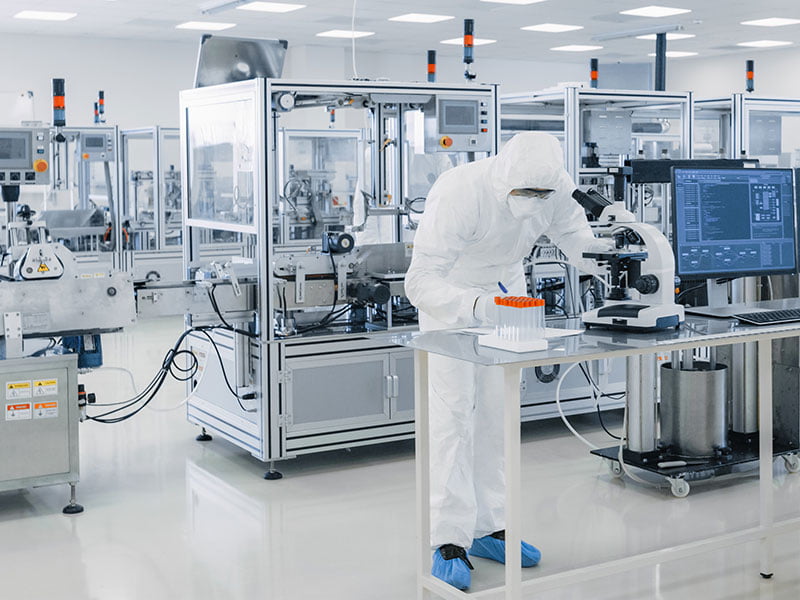Chicken breeding, quantum computing and wind turbine recycling are among 24 projects sharing in $50 million of funding from the federal government’s long running industry-led research program.
To be announced on Friday by Science and Industry minister Ed Husic, the funding comes from the 14th round of the Cooperative Research Centres Projects (CRC-P) initiative.
The projects will leverage a further $72 million of cash and in-kind contributions and involve 100 partners working across the country.
The latest round funded projects focused on the circular economy or the priority areas of the government’s upcoming National Reconstruction Fund (NRF), in another sign of a more targeted approach to research funding.

Mr Husic flagged the targeted approach to CRC-P projects when opening the round in January and said the projects will fill a pipeline for the $15 billion NRF.
“This round of grants is about putting great Australian know-how to good use,” Mr Husic said.
“Many of these projects are in National Reconstruction Fund priority areas, ensuring there is a steady pipeline of investment ready projects to consider in coming years.”
The CRC-P program targets small and medium businesses with grants of up to $3 million in matched funding for short-term research collaborations.
In the latest round, UNSW quantum spinout Diraq was awarded a $3 million grant to further develop and manufacture its technology to produce qubits, the basic units of information in quantum computing.
The project slots into the NRF’s enabling capabilities priority and comes on the heels of Australia’s mission to build the world’s first error-corrected quantum computer. Diraq received a separate $3.8 million research grant from the government just last month for its work on silicon quantum computer technology.
It is joined in the new CRC-P round by Victorian company OmnisOva, a CSIRO spinout based on the science agency’s patented advanced breeding technology that targets the removal of the major food allergen in chicken eggs.
It received a $1.5 million grant to continue the research towards making eggs safe for consumption by those with egg allergies.
Melbourne company Industrial Property Maintenance received a $3 million grant to develop its processing treatment and open a pilot facility for recycling wind turbines, matching up with the NRF’s advanced manufacturing and renewable tech priorities.
Gold Coast Rocket manufacturer Gilmour Space Technologies landed a grant to developing its high-performing Satellite Control System Stellar Gyros, while fellow space tech Inovor Technologies will use its grant to build sovereign capabilities for satellite operations.
The wider CRC program was established by the Hawke government and has invested more than $5 billion to support the establishment of 236 CRCs and 232 CRC Projects
An evaluation of the program in 2021 backed the program, finding it delivered outsized returns on government investments. But the report was kept secret by the Morrison government and only released earlier this year.
While sitting on the report, the then-government was facing calls for the scheme to be expanded from the peak representative body for industry-research collaboration.
The Morrison government was also accused of politicising the scheme with a “drip feed” of successful project announcements during the federal election campaign.
The report was unable to properly evaluate the CRC-P component which only launched in 2015. It recommended the smaller program be reassessed when more projects were completed.
The full list of CRC-P recipients and prjects are:
- Industrial Property Maintenance – Recycling composite wind turbine blades for circular economy
- Canopus – Growing Australia’s cloud gaming industry with AI-assisted Network Boost
- Advancell Isotopes – A platform for production of targeted alpha therapies for cancer treatment
- Lutyen – 3D printing houses in extreme and remote locations using local materials
- Gilmour Space Technologies – EDGy: Developing high-performing satellite control system Stellar Gyros
- Inovor Technologies – developing sovereign capabilities for satellite operations
- ITECH – Vertically integrated battery anode material development program
- Microtau – When Sharks Fly: Reducing fuel burn and emissions of commercial aircraft
- Diraq – Quantum computing controllers based on cryo-CMOS
- Speedpanel Holdings – A fire rated wall panel system for commercial and residential construction
- Ecopha Biotech – innovative development of biodegradable healthcare packaging products
- Navi Medical Technologies – The Neonav: Collaboration to deliver a novel device for safer newborn care
- VXB Aerospace – AI driven design of custom in-space propulsion to extend satellite ability
- Omnisova – Delivering allergen safe eggs to those suffering severe egg allergies
- Orica – In-Place Recovery: Solution mining of critical minerals
- Greatcell Energy – Roll-to-roll production of ultra-low cost perovskite cells
- Gelomics – Tissue-specific extracellular matrices for 3D cell and organoid culture
- Australian Vintage Ltd – Advancement of Australian lifestyle wines
- Go Resources – Development of biobased biodegradable sustainable industrial lubricants
- Telemedc – AI-based portable digital slit-lamp for anterior segment eye diseases
- Advanced Circular Polymers – AI-driven fused RGB and NIR hyperspectral vision for sorting waste plastics
- Revox Australia – Healing Australian Carbon Wounds Using Hemp Plantation and Construction
- Enviropacific Services – Creating construction materials from thermal treatment facility wastes
- H2Ex – Accelerating exploration and extraction of renewable natural hydrogen
Do you know more? Contact James Riley via Email.

